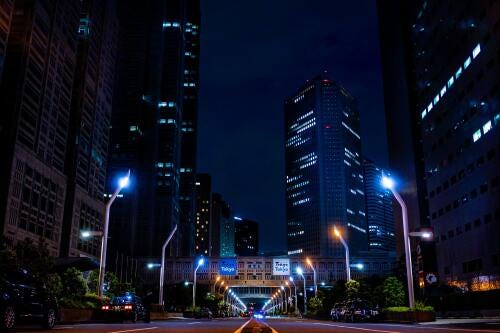From waste water treatment to synchronised traffic lights, the idea of smart infrastructure is not new. Still, it’s difficult to define what makes a city smart, and it’s even harder to tell whether the move towards smart cities will be beneficial to all or not.
Dear friends of Daily Philosophy,
This is a premium post, available only to supporters of Daily Philosophy. To be part of this exploration of our future, please subscribe right here:
By the way, I was informed that Substack got something wrong with their email sending, and it seems that you might have received yesterday’s email twice. Sorry about that.
In the previous post in this series, we had a look at the various ways human societies relate to nature. If you missed it, that post is right here:
In our series on the future of mankind, we talked previously about humanity’s attempts to colonise the oceans, and we will be returning to space exploration later. But since we touched upon city building and city governance already, let’s just have another look at where cities are going and what city life might be in the near (and not so near) future.
This is a big topic, and in the survey that I gave you two days ago, some remarked that these emails might be a bit too long to read every week — so I will send you slightly shorter pieces from now on, to give everyone enough time to read each article before the next one comes out. If you’re unhappy with that, please, as always, give me some feedback by sending me a message. I’m always happy to receive your comments. You can also comment publicly here:
And a last thing: the March issue of the PDF magazine had a few errors (one missing image in the Bentham article and some other typos). I’ve fixed those and, if you have a premium subscription, you can now download the corrected version at the pinned post on the Daily Philosophy Substack page.
Sorry about that and thanks!
Defining “smart”
Smart cities are everywhere nowadays... but they are not quite as new as one might think.
If we consider “smart” to mean something like “technologically augmented,” then of course every city is smart. Cities are in their very essence technological products. Streets and means of transport are technologies, as are water and food distribution, waste collection and disposal systems. Modern cities also incorporate power generation and distribution and many types of communication infrastructure: from post offices to telephone networks to glass fibre cabling. A city cannot exist without technology. So when we call a city “smart,” something else, something beyond a basic technological infrastructure, must be meant by that word.
Keep reading with a 7-day free trial
Subscribe to Daily Philosophy to keep reading this post and get 7 days of free access to the full post archives.





